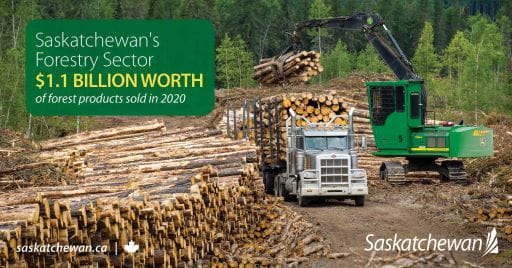Released on May 12, 2021
Forest Products Sales Over $1.1 Billion Last Year
Saskatchewan's forestry sector is booming, with over $1.1 billion worth of forest products sold in 2020, an almost 30 per cent increase over the previous year.
Prices for many forest products are now at record highs, including lumber, oriented strand board (OSB) and treated wood products, which are used in decks and fences. COVID-19 initially created market uncertainty in the forestry sector, but since last summer, global market demand has surged for home construction and renovation materials.
"Our forestry sector is a key economic driver and will be a leader of Saskatchewan's post-pandemic recovery efforts," Energy and Resources Minister Bronwyn Eyre said. "Forestry is an important sector for many communities in Saskatchewan and supports thousands of jobs, while producing important products that we all use, including tissue paper, cabinetry, and housing construction materials."

Forestry is currently northern Saskatchewan's largest sector, supporting nearly 8,000 jobs. There are seven major primary forest products facilities that produce lumber, OSB and pulp, and over 200 smaller businesses that supply a variety of primary and secondary forestry products. Hundreds of supply chain businesses also provide goods and services for forestry manufacturers, including in road construction, logging, trucking, reforestation and forest management.
"Tolko is proud of how our employees and contractors are staying dedicated to working safely during these unprecedented times, and we see how the strong forestry market is supporting jobs and our communities," Tolko's Vice President of Environment and Forestry Bob Fleet said.
More than 75 per cent of Saskatchewan's primary forest products are exported to other countries. Last year, forest product exports were valued at $700 million. Despite the challenges of COVID-19, Saskatchewan's forestry sector has been enhanced by a growing Asian economy and ongoing housing recovery in the U.S., which is seeing the highest number of housing starts in 15 years.
"Saskatchewan is well positioned to benefit from a number of emerging opportunities in the future, with further expansion of existing mills, new mills and increased employment and exports in this sector thanks to favourable market conditions," Legislative Secretary to Forestry Nadine Wilson said.
"Carrier Forest Products Ltd. is proud to invest and create jobs in the greenest building products industry in Saskatchewan, spurred on by the market surge at the end of 2020," Carrier Forest Products President Bill Kordyban said.
Saskatchewan is also home to the largest, 100 per cent First Nations-owned forest products mill in Canada, and Indigenous people comprise over 27 per cent of the province's total forestry sector workforce - the highest of any province. There are also dozens of Indigenous-owned forestry businesses, ranging from saw mills and timber harvesting operations to road construction, trucking and reforestation.
"Proudly owned by the Meadow Lake Tribal Council, profits from our NorSask Forest Products operation drives capital investment to increase the mill's production capacity, as well as supporting economic development, providing jobs and social programs, as well as infrastructure for the nine First Nations communities represented in the Tribal Council," Meadow Lake Tribal Council Industrial Investments LP President and CEO Al Balisky said.
Saskatchewan is expected to harvest and produce record levels of timber and levels of forest products into 2022. Development of the sector has the potential to generate over $2 billion in forest products sales annually and support nearly 12,000 jobs. Saskatchewan's Growth Plan includes a goal to double the growth of the province's forestry sector by 2030.
-30-
For more information, contact:
Robin SpeerEnergy and Resources
Regina
Phone: 306-519-5006
Email: robin.speer@gov.sk.ca
